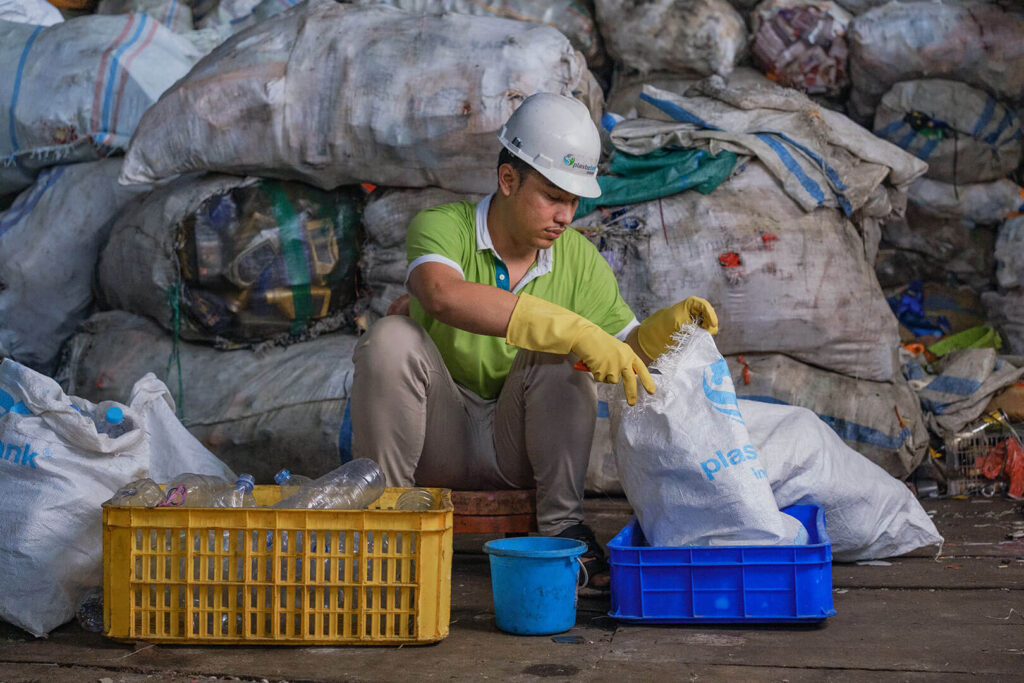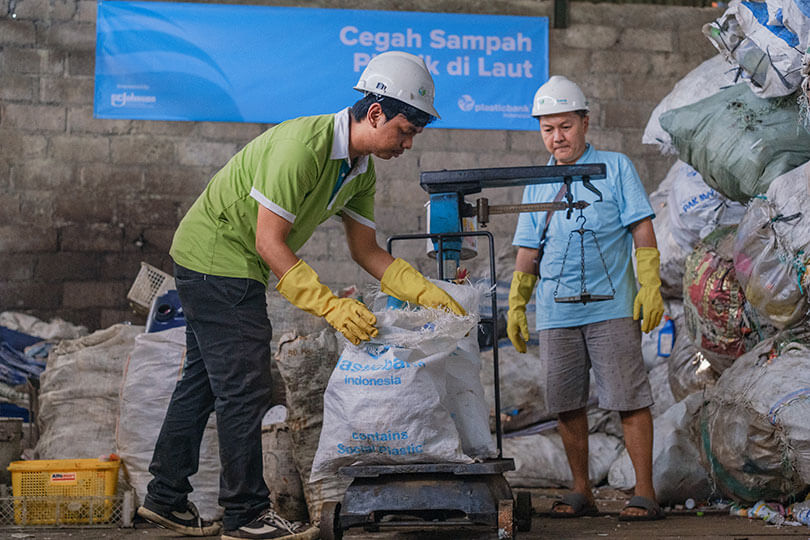Minutes to read: 4 minutes
 Sorting and counting plastic bottles at a Plastic Bank collection branch in Indonesia.
Sorting and counting plastic bottles at a Plastic Bank collection branch in Indonesia.
The time has come to make real sustainability efforts. Plastic pollution is a crisis of staggering proportions, threatening the health of our planet and all life forms that inhabit it. Single-use plastic such as bags, bottles, and packaging are significant contributors to the problem. These items often end up in our ocean, where they break down into microplastic that can be ingested by marine animals, entering the food chain and causing harm to both wildlife and humans. Plastic pollution also affects terrestrial ecosystems, as landfills overflow with non-biodegradable waste, leaching toxins into the soil and water sources.
When we look at the big picture, plastic pollution can seem insurmountable. However, it is crucial to remember that the power to tackle this crisis lies within our collective will and actions. A world free from plastic waste is possible, and together we can do this – one bottle at a time!
Sustainability Efforts Make a difference – One Bottle at a Time
At Plastic Bank, every bottle collected and recycled in our ecosystem represents a step toward our mission of enlivening a wasteless world. This is why we report the impact made by our Social Recycling movement not just through the kilograms of plastic waste we collect, but also in the equivalent number of plastic bottles.
In a world where the scale of plastic pollution can be overwhelming, our goal is to provide a relatable metric that resonates with people from all walks of life, allowing individuals, communities, and businesses to visualize the impact they are making with us. Each plastic bottle symbolizes a piece of the pollution puzzle – a fragment that represents humanity’s sustainability efforts and potential to alter the fate of our planet and uplift communities in vulnerable coastal areas.
But how does Plastic Bank calculate the equivalent number of bottles of a kilogram of plastic?
Bottle to Kilogram Research | Final Process
PET plastic bottles collected can either be raw (obtained from the environment as-is with possible dust, grime, caps, and labels), or they can be collected and exchanged clean (labels and caps removed, bottles cleaned). The acceptance of raw or clean bottles differs by branch and region. However, for a standardized comparison, the sustainability efforts study used raw bottles as an authentic metric to represent how bottles are recovered from the environment.
The study used controlled parameters, including specific brands, bottle volumes, and exchanged qualities (clean/raw). It involved testing samples from 58 collection branches in Indonesia and 44 branches in the Philippines. Each country’s Operations Team oversaw the project, ensuring measurement accuracy and data documentation using photos and tally sheets. Throughout the research, pre-calibrated analog or digital scales were used to measure the samples.
Results of Sustainability Efforts | 50 plastic bottles = One kilogram of plastic
Upon completing the experiment, small-sized PET bottles – 350mL and 600mL – were selected as the basis to calculate the bottle equivalent of one kilogram of plastic waste since they are the most commonly available size during collections.
| Indonesia – No. of small raw bottles in 1 kg | 53.08 bottles |
| Philippines – No. of small raw bottles in 1 kg | 59.69 bottles |
| Weighted average: | 56.39 bottles |
 Weighing a sack of plastic bottles at Plastic Bank collection branch.
Weighing a sack of plastic bottles at Plastic Bank collection branch.
Weights were assigned based on the approximate percentage of the number of samples in both countries. Based on weighted averages, the result indicates that, on average, 56.39 bottles of PET plastic are equivalent to one kilogram of collected plastic.
To calculate sustainability efforts in the amount of plastic collected, we rounded down as a conservative metric and accounting for the trend of manufacturers reducing the plastic weight of the primary packaging, we concluded 50 bottles as the equivalent of one kilogram of plastic collection.
Four Billion Bottles Milestone
In May 2023, the sustainability efforts of our Social Recycling movement reached a milestone of stopping over 80 million kilograms of plastic from reaching the ocean. This is the equivalent of more than four billion plastic bottles gathered, sorted, and exchanged by over 35,000 collection community members for additional income and access to life-improving benefits.
This is just a drop in the ocean compared to the amount of plastic litter in the environment. But we hope that each plastic bottle you encounter reminds you that change is possible and inspires you to take action. It is in your hands to engage with sustainability collective efforts to change the narrative of plastic pollution and improve the lives of collecting communities one bottle at a time!